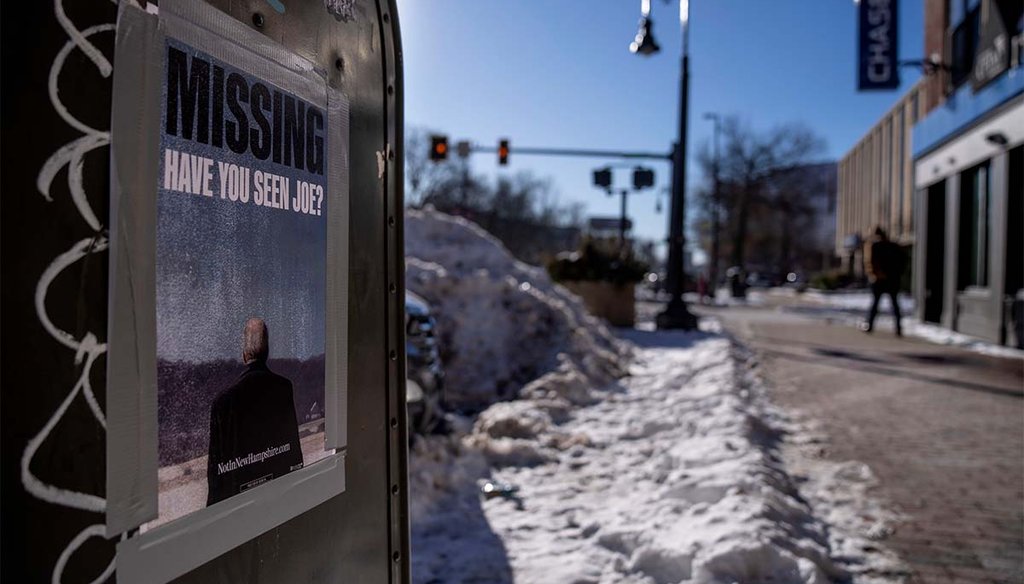

Our only agenda is to publish the truth so you can be an informed participant in democracy.
We need your help.


A poster bearing President Joe Biden’s likeness is taped to a mailbox Jan. 22, 2024, in Manchester, N.H. (AP)
The New Hampshire robocall is not an authentic recording of President Joe Biden. It was fabricated.
The New Hampshire attorney general is investigating and said the call seems to be artificially generated.
No spin, just facts you can trust. Here's how we do it.
"What a bunch of malarkey!" begins a robocall to New Hampshire voters that sounds like the voice of President Joe Biden.
But the entire call can be summed up with one of Biden’s often repeated words: malarkey.
The robocall sent two days before the New Hampshire primary is fabricated. Biden did not record the call, his campaign confirmed.
"We know the value of voting Democratic when our votes count," says the recording, obtained by NBC News. "It’s important that you save your vote for the November election. We will need your help in electing Democrats up and down the ticket. Voting this Tuesday only enables the Republicans in their quest to elect Donald Trump again. Your vote makes a difference in November, not this Tuesday."
The recording included a phone number people could call if they wanted to be removed from the call list.
That number was the cellphone of Kathleen Sullivan, a former New Hampshire Democratic Party chair. Sullivan is the treasurer of Granite for America, a political action committee encouraging Democrats to write in Biden’s name on the New Hampshire ballot.
Sullivan told PolitiFact that on Jan. 21 — two days before the primary — she received about a dozen calls from phone numbers she didn’t recognize. Sullivan said she spoke to one of the callers and the person told her about receiving the robocall.
Sullivan contacted the state attorney general and filed a complaint Jan. 22. The attorney general’s office issued a statement the same day announcing that it is investigating the call, which it said was "artificially generated based on initial indications."
The press release said the calls "appear to be an unlawful attempt to disrupt the New Hampshire Presidential Primary Election and to suppress New Hampshire voters," and instructed voters to disregard the call’s message. The press release said voting in the primary does not mean a voter cannot vote in the general election.
In New Hampshire, it is a felony to knowingly use fraudulent or misleading information to deter or prevent someone from voting.
"Spreading disinformation to suppress voting and deliberately undermine free and fair elections will not stand, and fighting back against any attempt to undermine our democracy will continue to be a top priority for this campaign," Biden-Harris campaign manager Julie Chavez Rodriguez said in a statement.
The attorney general encouraged people who received the robocall to email the Justice Department’s Election Law Unit (electionlaw@doj.nh.gov) and provide the date and time of the call and any other relevant information.
Biden’s name will not be on the primary ballot because the Democratic National Committee decided that in 2024 South Carolina would, for the first time, hold the first primary. Not only has New Hampshire traditionally had that first-in-the-nation spot on the primary calendar, but there is also a New Hampshire law requiring the state to set its primary first. Ultimately, New Hampshire law required that a Democratic primary be held Jan. 23, but the party will not use it to allocate the state’s delegates for the presidential nomination.
Ahead of the 2024 elections, an expert told PolitiFact that deepfakes, generated images and voice cloning could be used to imitate political candidates and target other politicians, voters and poll workers. Experts have also warned that foreign adversaries can use new generative artificial intelligence tools to conduct influence operations more efficiently and effectively. The new tools make it easier and cheaper to fabricate content such as political messages, profile photos, video footage and audio.
A robocall sounds like Biden telling Democrats not to vote in the New Hampshire primary.
The Biden campaign said the president did not record the call. The New Hampshire attorney general is investigating and said the call seems to be artificially generated.
We rate this claim Pants on Fire!
RELATED: How generative AI could help foreign adversaries influence U.S. elections
RELATED: Trump’s misleading claim that Haley is seeking Democrats to ‘infiltrate’ New Hampshire’s GOP primary
NBC, Fake Joe Biden robocall tells New Hampshire Democrats not to vote on Tuesday, Jan. 22, 2024
New Hampshire Attorney General, Voter Suppression Robocall Complaint to Election Law Unit, Jan. 22, 2024
New Hampshire statutes, 659:40 Bribing; Intimidation; Suppression, Accessed Jan. 22, 2024
Federal Election Commission, Statement of organization for Granite for America, Nov. 17, 2023
Matt Krisiloff, X post, Jan. 22, 2024
Email interview, Michael S. Garrity, New Hampshire Attorney General spokesperson, Jan. 22, 2024
Telephone interview, Kathleen Sullivan, treasurer of Granite for America, Jan. 22, 2024
Statement by Biden-Harris campaign manager Julie Chavez Rodriguez to PolitiFact, Jan. 22, 2024
In a world of wild talk and fake news, help us stand up for the facts.
